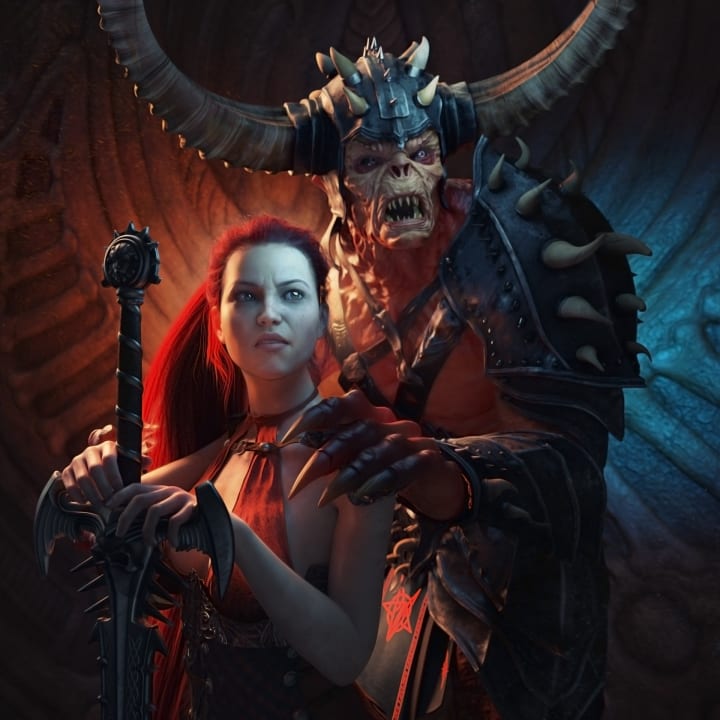5 Tips For Playing Neutral Characters
Exploring That Liminal Space Between Good and Evil, Law and Chaos

Roleplaying games allow us to take on the mantles of great heroes and villains, of wise wizards and noble knights, cunning sellswords and brutish barbarians. They allow us to tell stories in ways few other activities do. However, while it is easy to get caught up in discussions of Good and Evil, Law and Chaos as forces in the world, often times we forget about the fifth aspect of alignment; the Neutral option. For many of us, Neutral isn't an alignment component in and of itself, but an absence of alignment; a gray space we simply chose not to mark.
Since my 5 Tips For Playing Better Evil Characters remains one of my most-read pieces of gaming advice, I figured it was time to follow it up with something a little different this week, and go a little more in-depth on the Neutral element of alignment.
For those who enjoy this, don't forget to check out the rest of my Vocal archive, and to stop by my gaming blog Improved Initiative for even more content!
Tip #1: How Does Your Neutrality Interact With Other Parts of Your Alignment?

This section may not apply to those who sit comfortably in that True Neutral slot in the center of the alignment chart, but for everyone else Neutral is only one component of your alignment. So think of it as the tonic in a gin and tonic; an important part of the overall mix, and one that affects the final product.
For example, if your character is Neutral in terms of Law and Chaos, then this might reflect that they are more focused on results than they are on the particular methods used to get them. If upholding a law or a treaty achieves the results they want, perfect. If breaking those same laws and treaties will generate better results, that option is still on the table.
If a character is Neutral in terms of Good and Evil, then the focus on Law or Chaos becomes the gin in this situation. If they're lawful, do they follow a code of conduct as their central reference point of behavior? Whether a personal code, a religious one, or something more along the lines of chivalry or bushido? If they're more chaotic are they instead concerned with ensuring their own personal freedom, never doing anything that isn't of their own volition?
It's important to remember that the Neutral side of things is supposed to act as a clarifier regarding one's overall alignment. More than half the chart has some Neutral aspect to it, so make sure you think about this right out of the gate.
Tip #2: What Are Your Goals?

One of the most important things that can put a Neutral component of one's alignment into context is to ask what this character's goals are. Whether it's personal goals, professional goals, or if they are dedicated to a larger organization, you need to know what your character is looking to achieve. Their alignment should then tell you what sorts of things they'll do to reach those goals.
For example, does this character have high-minded goals like ending an oppressive regime that's turning people into slaves? Do they have a more personal goal of graduating from a wizarding academy, uncovering ancient relics of a lost civilization, or just getting enough treasure to offer a dowry so they can get married?
Those who need a little help in this area should definitely check out 100 Character Goals and Motivations, because while this is important for any character, it's particularly important for those with a capital N somewhere in their alignment.
Tip #3: Do They Actively Think About Neutrality?

One of the tropes of characters with a Neutral in their alignment, and particularly for characters who are in that True Neutral center spot, is that they have some kind of tally in their head that weighs and balances their actions. But most of us don't sit around asking how many good things we did today, and how many bad things we did, and what that says about us as individuals.
So take a moment and ask if your character actively thinks about neutrality as a concept, and whether it matters to them. If they're LN, for instance, do they consider it important to remain unbiased in the matters they're involved in? If they practice a particular faith do they actively need to balance their spiritual books to account for any harm or good they've caused? Or do they just view the world in terms of what's good for them and their own without reflecting too much on what that might mean?
Alignment is for us, as players, to think about. It's actually pretty rare that it's something the characters we play even acknowledge, much less contemplate.
Tip #4: Who Are You Connected To?

No character is an island. Even if you were a forest hermit before joining your companions on this adventure (something that isn't unheard of), chances are you still have some connection to someone. You have people who raised you, friends you care about, colleagues you respect... so take a moment and ask yourself who these people are, and what effect they've had on your character's life.
I talked about this in greater detail in Who Does Your RPG Character Care About?, but it bears repeating. Because who you spend time with will have an impact on who you are, how you act, and the things you value and believe. And, just as importantly, it can be used as a solid reason to get a character involved in things going forward.
After all, they might be neutral on the issue of whether the werewolves attacking a hamlet twenty miles away are really their problem. But if their best friend is going, then your character is going to go to watch their friend's back. Because even if those strangers and their plight don't motivate your character, helping someone that matters to them just might.
Tip #5: Remember It's Your Alignment, Not The Party's Alignment

This one calls all the way back to my 5 Tips For Playing Better Paladins, but it crops up a lot more often than you'd think. Just because your character has a Neutral alignment (either partially or completely) that doesn't mean everyone else has to.
Or, put another way, learn to compromise with the other members of your party so that you can all find a plan of action, agree on it, and move forward.
Some of your party members may also be Neutral. Some may be Good. Some (depending on your GM) may even be Evil. They may be Lawful or Chaotic, but all of you are in this together, though. You don't all have to follow the same creeds and the same gods, or even have the same values and beliefs, but you can't just fold your arms and say, "I'm Neutral, I can't do that." Being Neutral doesn't prevent you from doing anything... in many cases, it literally lets you go both ways depending on the needs of the situation. So embrace that flexibility, rather than carving out a third spot and demanding folks come over to where you're standing.
Like, Follow, and Stay in Touch!
That's all for this week's Fluff post!
For more of my work, check out my Vocal archive. Or if you'd prefer to read some of my books, like my alley cat thriller Marked Territory, it's sequel Painted Cats, my sword and sorcery novel Crier's Knife or my recent short story collection The Rejects, then head over to My Amazon Author Page!
To stay on top of all my latest releases, follow me on Facebook, Twitter, and now Pinterest as well! To support my work, consider Buying Me a Ko-Fi, or heading to The Literary Mercenary's Patreon page to become a regular, monthly patron. That one helps ensure you get more Improved Initiative, and it means you'll get my regular, monthly giveaways as a bonus!
About the Creator
Neal Litherland
Neal Litherland is an author, freelance blogger, and RPG designer. A regular on the Chicago convention circuit, he works in a variety of genres.
Blog: Improved Initiative and The Literary Mercenary
Reader insights
Outstanding
Excellent work. Looking forward to reading more!
Top insights
Compelling and original writing
Creative use of language & vocab
Easy to read and follow
Well-structured & engaging content
Expert insights and opinions
Arguments were carefully researched and presented
Eye opening
Niche topic & fresh perspectives
Masterful proofreading
Zero grammar & spelling mistakes
On-point and relevant
Writing reflected the title & theme






Comments
There are no comments for this story
Be the first to respond and start the conversation.